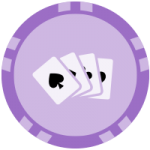Learn proper poker ranges to make you a strong player from any position. Adjust your ranges against different style opponents to be a successful player.

What does the concept of a
'range' mean in poker terms? And how can we use this concept to improve our results?
When almost all of us first began playing poker we did so with only a little rudimentary knowledge, possibly little more than knowing the rules of the game. After putting in a few hours we might understand which are the best hands to play, even if we do still continue to play far too many of them. But without anybody there to point out how we can improve,
the majority of beginners will continue to focus on the cards they are holding, without even thinking of what their opponents might have.Learning to think in terms of a range of hands your opponent can be holding, rather than individual hands, is critical in learning how to hand read. It is also the key to using much of the poker maths you will come across, expected value (EV) calculations for example. Let me explain.
The Starting Point

Poker is a game of incomplete information. Given that the game is all about making decisions, it logically follows that
the more information we have, the better quality decisions we can make. I'm sure anybody reading this understands that some hands dealt pre flop will stand to make more money on average than others, so again it logically follows that if we are first to act UTG then we need to play a tighter 'range' of hands because we have less information than if we were on the button and had seen everybody fold up to us.
So knowing this we then construct
a default range of hands for us to open from each position, starting off tight from UTG and gradually getting looser up until we reach the button. This will give us familiarity with what our opponents opening hand range might be, because once we read their
'raise first in%' stat on our
HUD we can compare with our own opening ranges.
This knowledge of what hands an opponent is beginning the hand with, is the starting point of hand reading. Every decision they will make following their opening bet/call will give us some information which may allow us to narrow down the original range.
Analysis

There are hands which have gone down into folklore where a legendary player has famously told his rival exactly what cards he is holding, but in truth this is a rare event. You shouldn't believe that it is necessary to ever be this accurate, but your win rate will feel the benefit the moment you start working on your understanding of different ranges in different situations.
A mistake in poker terms is often coined as playing our hand differently than how we would have played it if we could see every players cards. This idea of a range of hands is the next best thing we have available. Even if we don't have much information to allow us make an accurate decision,
it's certainly going to be better over the long run than just guessing. 
You may have discovered that it's reasonable to assume that the villain has so many value hands in his range, that he will call a much larger value bet than you previously expected. Maybe you can make a tight, disciplined fold after discovering that the
pot odds on offer are just a fraction too small to make a profitable call.
This repeated analysis of problem hands using mathematical tools to examine the effect of different hand ranges in a particular spot
is what makes the good players good. You can talk about psychology, self discipline, hard work, bringing your 'A' game to the table every session etc, but this familiarity of the many situations possible and how different hand ranges require you to adjust your play is what the game is all about.
This is what having an edge truly means. If you understand a situation to a deeper level than your opponent then you will make fewer mistakes, so you have a mathematical edge.
This is where your profit comes from. It doesn't come from when you get your 100bb stack in the middle pre flop sitting in the big blind with AA and your opponent shows you KK. You might walk away with their stack 80% of the time, but that's not really an edge is it? The money was always going to end up in the middle anyway!Gaining The Edge

Some of these points might sound as if they are nice to understand but probably won't really have much of an effect. But poker is a game of small edges. In today's games anything more than a 5bb/100 hands win rate is hard earned, fighting for just a meagre five big blinds every one hundred hands doesn't sounds like a lot,
but it's the difference between a break even player and somebody who is crushing their tables. Using your knowledge of a players hand range to exploit them every couple of hundred hands
can make a nice difference to your win rate.Let's take an insight into how we can use knowledge of our opponent's hand range against them in a simple situation.
Imagine we are playing in a nine handed micro stakes cash game. A very tight ABC type player who we have played many hands with before opens from early position. We know to the point of almost 100% certainty that this player only opens AK and large pairs from this position. We also know that he will never put all his chips in the middle without two pair or better.
This information gives us an incredible edge if the flop comes low and connected. We have the option to raise either the flop or the turn and can fire more bets at him putting him under a lot of pressure and we will expect him to fold his over pair a large percentage of the time. Knowing that this player will never have a small pocket pair to make a set or a suited connector hand type to hit draws to a flush or straight, allows us to win the pot with a second best hand.
AKA 'free money!'.
Another basic situation where we need to be aware of our opponents opening hand range is when we have a read that they tend not to fold enough to 3 bets. Here we might consider 3 betting a hand such as AJs in position for value
to take advantage of our expected equity edge post flop. What I have observed countless times though is that some players making the 3 bet in this situation haven't taken into account that the open raiser is so tight, that he never has weaker Ax hands to begin with. I'm sure you can see that this can be a huge problem when both players flop a pair of aces in an already bloated pot, and there is no chance that the villain ever has a worse ace than us!
Capped Hand Ranges

I want to finish with an explanation of what happens when we know our opponents hand
range has an upper limit based on how he played the early streets.
There are certain situations where we can rule out to a very high degree of certainty, some of the strongest hands possible given the board. For example in a multi way pot on a 865 flop with a flush draw, if the first player to act bets a normal size and everybody else calls we can be sure that nobody is holding 88 almost all of the time, and probably 66 too. In the smaller micro stakes games, particularly full ring tables, you will see players slow play when they shouldn't, but on average we can form a reliable read here.
So as we saw in the examples above, this concept of knowing that our opponent can not be holding a monster allows us to formulate plans to win hands when we don't have the best hand. Even if we get looked up every now and then after making a creative bluff it doesn't mean we did anything wrong, it just means that against whoever called us it might not be quite as profitable as it was before.
I hope the examples above are helpful, and look forward to reading your comments below!
Other Top Recommended Content
If you enjoyed reading this article, take a look at some of our other top recommended articles!
Or why not take a look at some PokerVIP coaching videos?

 Poker is a game of incomplete information. Given that the game is all about making decisions, it logically follows that the more information we have, the better quality decisions we can make. I'm sure anybody reading this understands that some hands dealt pre flop will stand to make more money on average than others, so again it logically follows that if we are first to act UTG then we need to play a tighter 'range' of hands because we have less information than if we were on the button and had seen everybody fold up to us.
Poker is a game of incomplete information. Given that the game is all about making decisions, it logically follows that the more information we have, the better quality decisions we can make. I'm sure anybody reading this understands that some hands dealt pre flop will stand to make more money on average than others, so again it logically follows that if we are first to act UTG then we need to play a tighter 'range' of hands because we have less information than if we were on the button and had seen everybody fold up to us.
 You may have discovered that it's reasonable to assume that the villain has so many value hands in his range, that he will call a much larger value bet than you previously expected. Maybe you can make a tight, disciplined fold after discovering that the pot odds on offer are just a fraction too small to make a profitable call.
You may have discovered that it's reasonable to assume that the villain has so many value hands in his range, that he will call a much larger value bet than you previously expected. Maybe you can make a tight, disciplined fold after discovering that the pot odds on offer are just a fraction too small to make a profitable call.



